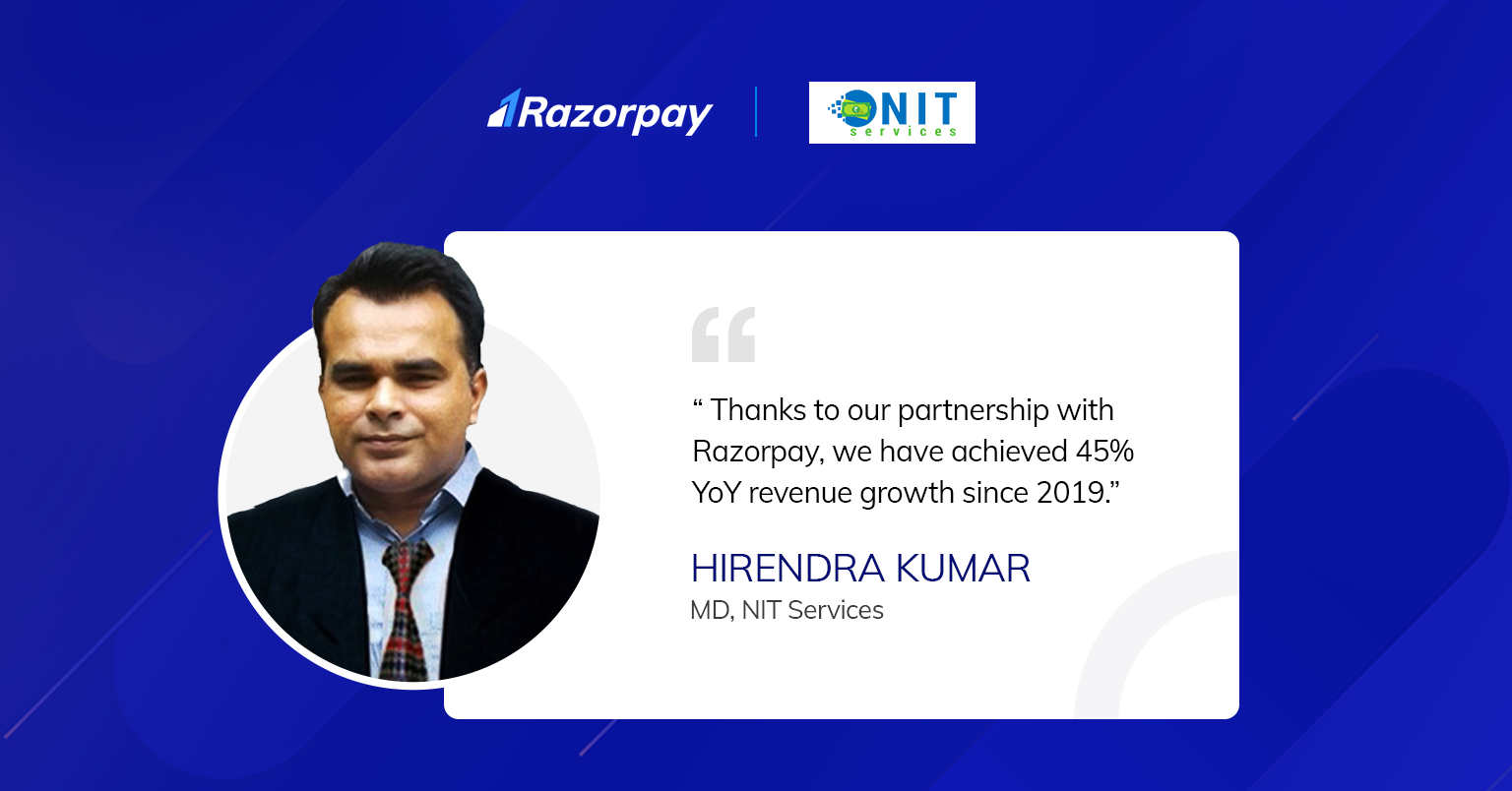The move from cash to cashless is transforming the way consumers interact with businesses. Modern consumers want a comprehensive, safe and easy-to-use shopping experience. That’s the push that made digital payments de rigueur across all business sectors – even in ones that were considered a challenge to digitize a decade ago. Take the retail sector, for instance, where payment gateways today are a crucial link in its value chain. However, this switch didn’t happen overnight. Technology enablers, like NIT Services, have been silently, yet relentlessly, working to bridge the digital divide.
Here’s how NIT Services is helping millions of retail shops in rural India reach online customers with the help of the Razorpay Partner Program.
Taking Indian Retailers Online
The retail market in India is worth $972 billion, according to EY estimates. Roughly 84% of this market belongs to unorganised tiny retail stores. Online giants like Amazon, Walmart and Future Retail are already vying for their share of the market, while businesses like DMart have the advantage of a large retail network on their side. Despite this, offline retail stores have carved a space for themselves in the heart of the hyper-local. According to Nielsen data, over 12 million kiranas remain a preferred shopping choice for a majority of Indians even today.
Last year, when COVID-19 forced nationwide lockdowns, these conventional family-run neighbourhood retail stores, painstakingly met emergency, fill-in and stock-up requirements. But, it wasn’t easy. While stocking and lack of logistical infrastructure were big challenges, the most critical barrier proved to be visibility. Most of these businesses were ill-equipped to reach their regular customers that were now holed up within their homes.
Not surprisingly, there were casualties. Hindustan Times reports that at least 20 per cent of Indian retailers have shut their businesses due to COVID-19. Over 600,000 kirana stores shut down in the first two months of the lockdown in 2020.
As Indians spent more time and money online, the organized retail sector also posed a growing threat in terms of business volume and margins. That’s when digital enablers like NIT services acted as a beacon of hope and helped simple retailers become e-tailers.
Bridging the Rural Retail Divide with Razorpay
Hirendra Kumar, founded New India Transaction Services (a.k.a NIT Services) in March 2019 with a vision to include rural retail businesses in India’s mainstream economy through digital services like AEPS, DMT and VAS services.
The plan was simple: help rural retail shops find a way to accept online payments.
Kumar found Razorpay’s QR Codes was the simple, affordable and secure solution that would help his company push the envelope for rural retailers. “It took me just one meeting to get convinced to implement Razorpay QR Codes (for rural merchants) and Razorpay Payment Gateway (for urban retailers). Now, I’ve been a part of the Razorpay Partner Program for two and a half years. I still believe in the products a lot. I think they have the power to transform the entire market in the coming years,” says Kumar.
Scaling Faster with Razorpay Partner Program
 Kumar and his team started out by onboarding and training retail shop owners in Bihar, Jharkhand, West Bengal and Odisha. “In the last couple of years, we faced operational hiccups as we solely depended on the support of third-party vendors to onboard merchants. That’s when we decided to also take things into our own hands,” says Kumar.
Kumar and his team started out by onboarding and training retail shop owners in Bihar, Jharkhand, West Bengal and Odisha. “In the last couple of years, we faced operational hiccups as we solely depended on the support of third-party vendors to onboard merchants. That’s when we decided to also take things into our own hands,” says Kumar.
NIT services then hired and trained in-house executives to expedite the onboarding process, helping the company scale up. As a Razorpay partner, Kumar received priority support in onboarding and troubleshooting to aid his expansion plans. “Back in the days, it took us 15 to 20 days to activate a single merchant, which was a major roadblock. Now, every merchant starts accepting online payments within 2 days of onboarding. Apart from that, we have also empowered a few merchants with Smart Collect and Subscriptions. Then routing is there, more importantly, QR codes, which any merchant can use – whether he is in the remote sector, suburban or urban.”
“In the last 4 – 5 months, we received tremendous support from the Razorpay partnership team. We have now grown our merchant base by almost 60 per cent. We still work with few vendors, but mainly we do it on our own through our employees and distributors. With the help of Razorpay partner dashboard, we onboard and manage the mother dashboard, and the retailers have their own dashboard,” Kumar explains.
After some basic handholding and training that lasts up to 10 days, retail merchants that didn’t even own email addresses, are able to accept and manage online payments. Encouraged by the rapid pace of growth, NIT Services now wants to tackle urban retail merchants. “Thanks to our partnership with Razorpay, we have achieved 45% YoY revenue growth since 2019. Now, we are planning to grow our merchant base by another 150 percent within the next quarter.”
Today, Razorpay Partner Program supports more than 60,000 partners across India. Each Razorpay partner enjoys lucrative commissions and a fixed referral bonus of up to Rs 500 on each successful referral.



